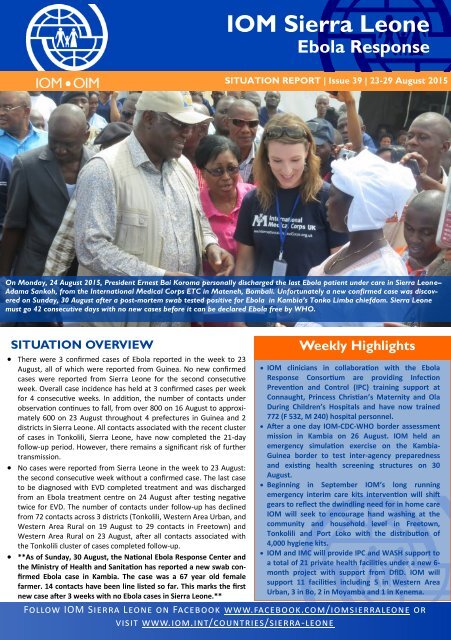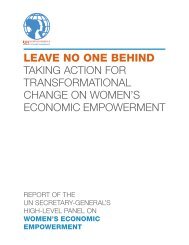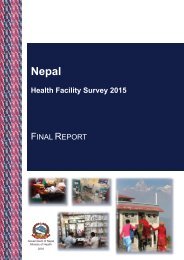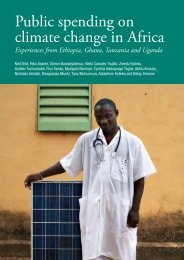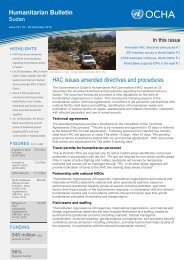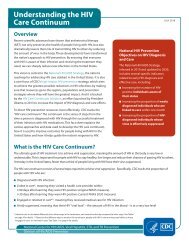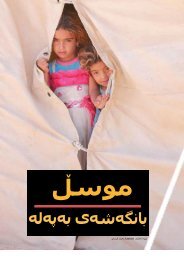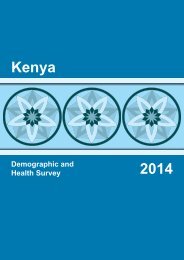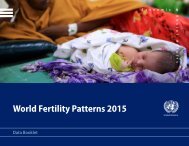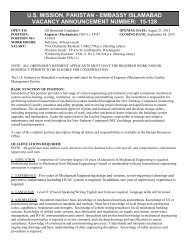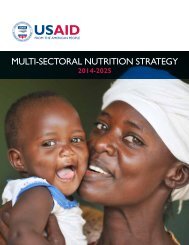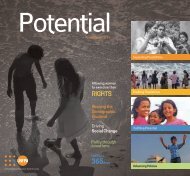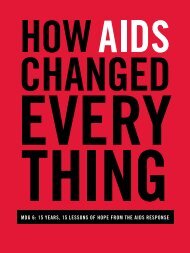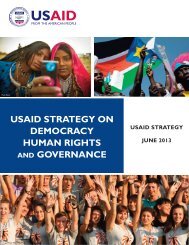IOM Sierra Leone
REsG0
REsG0
- No tags were found...
Create successful ePaper yourself
Turn your PDF publications into a flip-book with our unique Google optimized e-Paper software.
<strong>IOM</strong> <strong>Sierra</strong> <strong>Leone</strong><br />
Ebola Response<br />
SITUATION REPORT | Issue 39 | 23-29 August 2015<br />
© <strong>IOM</strong> 2015<br />
© <strong>IOM</strong> 2015<br />
On Monday, 24 August 2015, President Ernest Bai Koroma personally discharged the last Ebola patient under care in <strong>Sierra</strong> <strong>Leone</strong>–<br />
Adama Sankoh, from the International Medical Corps ETC in Mateneh, Bombali. Unfortunately a new confirmed case was discovered<br />
on Sunday, 30 August after a post-mortem swab tested positive for Ebola in Kambia’s Tonko Limba chiefdom. <strong>Sierra</strong> <strong>Leone</strong><br />
must go 42 consecutive days with no new cases before it can be declared Ebola free by WHO.<br />
SITUATION OVERVIEW<br />
There were 3 confirmed cases of Ebola reported in the week to 23<br />
August, all of which were reported from Guinea. No new confirmed<br />
cases were reported from <strong>Sierra</strong> <strong>Leone</strong> for the second consecutive<br />
week. Overall case incidence has held at 3 confirmed cases per week<br />
for 4 consecutive weeks. In addition, the number of contacts under<br />
observation continues to fall, from over 800 on 16 August to approximately<br />
600 on 23 August throughout 4 prefectures in Guinea and 2<br />
districts in <strong>Sierra</strong> <strong>Leone</strong>. All contacts associated with the recent cluster<br />
of cases in Tonkolili, <strong>Sierra</strong> <strong>Leone</strong>, have now completed the 21-day<br />
follow-up period. However, there remains a significant risk of further<br />
transmission.<br />
No cases were reported from <strong>Sierra</strong> <strong>Leone</strong> in the week to 23 August:<br />
the second consecutive week without a confirmed case. The last case<br />
to be diagnosed with EVD completed treatment and was discharged<br />
from an Ebola treatment centre on 24 August after testing negative<br />
twice for EVD. The number of contacts under follow-up has declined<br />
from 72 contacts across 3 districts (Tonkolili, Western Area Urban, and<br />
Western Area Rural on 19 August to 29 contacts in Freetown) and<br />
Western Area Rural on 23 August, after all contacts associated with<br />
the Tonkolili cluster of cases completed follow-up.<br />
**As of Sunday, 30 August, the National Ebola Response Center and<br />
the Ministry of Health and Sanitation has reported a new swab confirmed<br />
Ebola case in Kambia. The case was a 67 year old female<br />
farmer. 14 contacts have been line listed so far. This marks the first<br />
new case after 3 weeks with no Ebola cases in <strong>Sierra</strong> <strong>Leone</strong>.**<br />
Weekly Highlights<br />
<strong>IOM</strong> clinicians in collaboration with the Ebola<br />
Response Consortium are providing Infection<br />
Prevention and Control (IPC) training support at<br />
Connaught, Princess Christian’s Maternity and Ola<br />
During Children’s Hospitals and have now trained<br />
772 (F 532, M 240) hospital personnel.<br />
After a one day <strong>IOM</strong>-CDC-WHO border assessment<br />
mission in Kambia on 26 August. <strong>IOM</strong> held an<br />
emergency simulation exercise on the Kambia-<br />
Guinea border to test inter-agency preparedness<br />
and existing health screening structures on 30<br />
August.<br />
Beginning in September <strong>IOM</strong>’s long running<br />
emergency interim care kits intervention will shift<br />
gears to reflect the dwindling need for in home care<br />
<strong>IOM</strong> will seek to encourage hand washing at the<br />
community and household level in Freetown,<br />
Tonkolili and Port Loko with the distribution of<br />
4,000 hygiene kits.<br />
<strong>IOM</strong> and IMC will provide IPC and WASH support to<br />
a total of 21 private health facilities under a new 6-<br />
month project with support from DfID. <strong>IOM</strong> will<br />
support 11 facilities including 5 in Western Area<br />
Urban, 3 in Bo, 2 in Moyamba and 1 in Kenema.<br />
Follow <strong>IOM</strong> <strong>Sierra</strong> <strong>Leone</strong> on Facebook www.facebook.com/iomsierraleone or<br />
visit www.iom.int/countries/sierra-leone
<strong>IOM</strong> and IMC to launch IPC/WASH intervention<br />
at 21 private health care facilities<br />
With the decline of EVD incidence and return to general<br />
health services, IPC and Water Sanitation and Hygiene<br />
(WASH) at health facilities represents a significant priority<br />
to ensure optimum care for patients and occupational<br />
health for health care workers. There is an ongoing project<br />
on IPC collaboration between the Ministry of Health and<br />
Sanitation (MOHS) and Ebola Response Consortium (ERC)<br />
supporting IPC and WASH of 22 government hospitals.<br />
However, there are currently no projects to date that supports<br />
IPC and WASH of private hospitals which account for<br />
around 20% of health services utilisation.<br />
Considering that a significant number of private hospitals<br />
have not been fully operational since the EVD outbreak<br />
began in May 2014, a concerted effort consisting of resources,<br />
technical knowledge, training and sustained mentorship<br />
is necessary to achieve full functionality and practice<br />
change in these facilities. IPC training for medical practitioners<br />
and non-clinical health care workers, availability<br />
and use of PPE and IPC supplies, waste management,<br />
screening and isolation areas and water availability constitute<br />
key priorities for private health facilities to ensure<br />
effective, efficient and safe patient care and a conducive<br />
work environment for all health care workers.<br />
Supported by funding of the Department for International<br />
Development (DFID), the International Organization for<br />
Migration (<strong>IOM</strong>) and the International Medical Corps (IMC)<br />
collaborated with MOHS on a one month IPC and WASH<br />
needs assessment from 15 June – 15 July 2015 of 30 Christian<br />
Health Association of <strong>Sierra</strong> <strong>Leone</strong> (CHASL) private<br />
health facilities nationwide. The assessment categorised<br />
the 30 private facilities into High Priority, Medium Priority<br />
and Low Priority and resulted in 8 of 30 facilities, including<br />
1 hospital, being assessed in the High Priority category in<br />
terms of urgently requiring support in IPC and WASH. Sizeable<br />
deficiencies were noted in health screening and isolation<br />
areas, availability and use of Personal Protective<br />
Equipment (PPE)/IPC supplies, and water availability/<br />
shortage in these 8 facilities with IPC training and waste<br />
management also requiring reinforcement.<br />
An additional 17 out of 30 facilities, including 5 hospitals,<br />
were assessed to be in the Medium Priority category and<br />
revealed significant gaps in IPC and WASH. <strong>IOM</strong> and IMC<br />
will provide support to a total of 21 private health facilities<br />
throughout the 6-month project duration. <strong>IOM</strong> will support<br />
11 facilities in Western Area Urban (5), Bo (3), Moyamba<br />
(2) and Kenema (1) while IMC will support 10 facilities<br />
in Kambia (1), Kailahun (3), Port Loko (3), Bonthe (1),<br />
Koinadugu (1) and Bombali (1). Due to the importance of<br />
training and PPE use/availability, 2 of the 5 evaluated areas,<br />
<strong>IOM</strong> and IMC will provide IPC training and PPE use/<br />
availability support to all 21 selected facilities and targeted<br />
support in the areas of waste management, screening/<br />
isolation and water availability depending on the individual<br />
needs of the facility.<br />
Since all of the health facilities assessed were found to be<br />
less than adequate in at least one of the IPC categories and<br />
<strong>IOM</strong> <strong>Sierra</strong> <strong>Leone</strong> Ebola Response Situation Report | Issue 39 | 23-29 August 2015<br />
IPC measures at each facility need to be comprehensive in<br />
order to ensure the safety of health workers, patients, and<br />
visitors, <strong>IOM</strong> and IMC envision a phased approach. The<br />
initial phase includes the health facilities identified requiring<br />
the most urgent support to IPC and WASH measures<br />
due to patient volume. A second phase to take place after<br />
the completion of the proposed project would include similar<br />
interventions at additional private health facilities in<br />
the CHASL and <strong>Sierra</strong> <strong>Leone</strong> Medical and Dental Council<br />
(SLMDC) networks.<br />
<strong>IOM</strong>/CDC/WHO tour border crossing points in<br />
Kambia<br />
As new cases continue to be recorded in Guinea, on 26<br />
August a 10-person delegation comprising <strong>IOM</strong>/CDC/WHO<br />
staff members toured Border Crossing Points in Samu,<br />
Bramaia and Gbileh Dixon chiefdoms, Kambia district.<br />
The visit assessed the level of EVD preparedness and activities<br />
along the crossing points with a view to scaling up response<br />
approaches. The one day exercise informed revealed<br />
migratory flow information between Guinea and<br />
<strong>Sierra</strong> <strong>Leone</strong> and the operational difficulties faced by the<br />
Republic of <strong>Sierra</strong> <strong>Leone</strong> Armed Forces (RSLAF) personnel<br />
who are deployed at 47 category B and C crossing points<br />
along the border. <strong>IOM</strong>’s border related activities include<br />
data collection via Flow Monitoring Points, health screening/monitoring<br />
and re-supply of materials necessary for<br />
the monitoring process.<br />
<strong>IOM</strong> participates in Kambia-Forecariah cross<br />
border task force meeting<br />
© <strong>IOM</strong> 2015<br />
<strong>IOM</strong>, US CDC and WHO staff at Kalangba border<br />
crossing point, Kambia on 26 August 2015.<br />
The most recent fortnightly meeting hosted by the Kambia<br />
DERC on 27 August 2015 was to support current cross border<br />
interventions between Guinea and <strong>Sierra</strong> <strong>Leone</strong> and to<br />
follow up on agreed actions from the previous meeting for<br />
a resilient end to Ebola.<br />
Partners present included <strong>IOM</strong>, US CDC, WHO, RSLAF, the<br />
Red Cross, UNICEF, GOAL and other NGOs. Although Kambia<br />
had seemingly completed 42 days without new infections,<br />
the new case on Sunday in Tonko Limba chiefdom<br />
and positive case incidence in Ratoma, near the Guinean<br />
capital of Conakry led participants to continue to call for<br />
urgent action with a range of recommendations to address<br />
emerging cross border issues and to scale up coordination<br />
and collaboration amongst partners and the security forces<br />
in order to stem the rate of infections.<br />
PAGE 2
<strong>IOM</strong> Kambia field monitors continue their work<br />
On 26 August 2015, Zainab Kamara and her interim care<br />
kit colleagues were engaged in the urgent distribution of<br />
kits in the communities of Debia, Rokupr, Bamoi Luma,<br />
Magbety and households in Kambia town. Interim Care<br />
Kits (ICKs) are prepositioned in 880 communities in Kambia<br />
with 822 Community Health Monitors (CHMs) under the<br />
supervision of 5 <strong>IOM</strong> Field Monitors and 13 Community<br />
Surveillance Supervisors (CSS). Kits are stored at Peripheral<br />
Health Units in all seven chiefdoms of Kambia district.<br />
A recent case in Kambia on Sunday and intensive cross<br />
border movement from neighbouring Guinea demonstrates<br />
the potential positive impact of pre-positioned care<br />
kits in the area should further cases be reported. Many<br />
areas of Kambia are difficult to reach by road during the<br />
rainy season and response time by medical teams can be<br />
severely affected.<br />
Mohamed Turay, is one of <strong>IOM</strong>’s Field Monitors engaged<br />
in community supervision in Koya village, Samu Chiefdom,<br />
Kambia. He gauges the perceptions of the Community<br />
Health Monitors (CHMs) about the use of the items in care<br />
kits. Monitoring of this nature provides insight into the<br />
strengths and weaknesses of the kits, their proper use and<br />
method of distribution in various communities. Monitoring<br />
has revealed a need for refresher training of CHMs on mixing<br />
of chlorine solution and how to wear and remove<br />
gloves and aprons. “Although we rolled out trainings for<br />
the CHMs earlier in the summer, a reduced case load<br />
means more complacency and the need for a renewed<br />
focus on the correct and proper use of the kits.”<br />
<strong>IOM</strong> <strong>Sierra</strong> <strong>Leone</strong> Ebola Response Situation Report | Issue 39 | 23-29 August 2015<br />
Health Screening Advisory Teams in action<br />
Since Wednesday, 5 August <strong>IOM</strong> Health Screening Advisory<br />
Teams (HSAT) have been active in Ola During Children’s<br />
Hospital and Princess Christian’s Maternity Hospital.<br />
In collaboration with the Ministry of Health and Sanitation<br />
and respective Ebola Response Consortium partner agencies,<br />
<strong>IOM</strong> is working to optimize health screening systems<br />
at Ola During Children’s Hospital, Princess Christian Maternity<br />
Hospital and other medical facilities. <strong>IOM</strong> Health<br />
Screening Advisory Teams (HSAT) will conduct continuous<br />
capacity-building of the end-to-end health screening system<br />
to include health screening system layout, health<br />
screener training, system monitoring, data collection/<br />
management and adherence to health screening standard<br />
operating procedures (SOPs).<br />
<strong>IOM</strong> HSATs are comprised of an international clinician<br />
team leader and national clinician assistant and dedicated<br />
to health screening system optimization for a total period<br />
of four months to the end of 2015.<br />
Presently HSATs are conducting intensive training/<br />
mentoring of health screeners and optimization of the<br />
health screening system. HSATs are working hard to ensure<br />
effective and comprehensive monitoring of all hospital<br />
entry health screening points.<br />
HSATs will collaborate closely and routinely meet with<br />
MOHS and respective ERC partner agencies to provide<br />
timely information on all activities. HSATs produce monthly<br />
reports for distribution to all hospital stakeholders to<br />
track hospital progress against indicators. HSAT deployment<br />
and capacity is flexible in order to allow for expansion<br />
to other health facilities as required.<br />
Cumulative Training Academy/Mobile Training operational data for 01 December 2014– 30 August 2015<br />
(weekly numbers in brackets)<br />
Course Name<br />
Number of<br />
courses run<br />
Total number of<br />
National students<br />
Total number of<br />
International Students<br />
Cumulative<br />
Total<br />
3 day Ebola clinician IPC 23 589 355 944<br />
2 day Simulated Patient<br />
care<br />
IPC support to Gov’t 34 (5) 772 (128) 0 772<br />
hospitals<br />
1 day Ebola clinical IPC<br />
2 day Simulated patient<br />
care<br />
4 26 59 85<br />
1 day clinical<br />
4 25/65 41/33 164<br />
augmentation/ 1 day<br />
clinical pilot/RING IPC<br />
3 day basic IPC/PPE/3 67 5,863 51 5,914<br />
day WHO Ebola basic IPC<br />
Mobile Training 3 day 39 1,443 0 1,443<br />
IPC/PPE/Clinical<br />
Decontamination/2 day<br />
modified IPC<br />
3 day clinical frontline 2 20 4 24<br />
IPC (COMAHS)<br />
Total 173 (5) 8,586 (128) 543 9,346<br />
PAGE 3
<strong>IOM</strong> <strong>Sierra</strong> <strong>Leone</strong> Ebola Response Situation Report | Issue 39 | 23-29 August 2015<br />
Social Mobilization shifts to community ownership, impacts <strong>IOM</strong> hygiene kit distribution<br />
Until recently the NERC and its partners have pursued an<br />
approach to the Ebola response that has been district-led<br />
and centrally supported. As the epidemic response shifts<br />
from containment towards elimination, decentralized systems<br />
for epidemic control – including active case detection<br />
(surveillance, active case finding,<br />
contact tracing),<br />
intensified social mobilization and<br />
deepened community engagement,<br />
and ‘rapid response’ systems to<br />
quickly address emerging<br />
micro-epidemics. Therefore, the<br />
response will now shift ownership<br />
to chiefdom and community level<br />
especially around the drivers of<br />
transmission that include fear, lack<br />
of trust and collaboration from the<br />
communities and the communities’<br />
tendency to seek health care<br />
through informal structures.<br />
The overall strategic approach for<br />
© <strong>IOM</strong> 2015<br />
engendering community ownership will be built around the<br />
engagement of the traditional leadership<br />
(paramount and section chiefs and village heads) in effective<br />
dialogues and holding them accountable for rapid response<br />
or outbreak preparedness. Effective and strategic<br />
community-led responses will be achieved by developing<br />
simple Community Action Plans (CAP) in a participatory<br />
manner with the existing community structures such as<br />
BEST of the WEB (click links for story):<br />
Distribution of emergency care kits in Debia<br />
community, Kambia on 26 August 2015.<br />
<strong>IOM</strong> <strong>Sierra</strong> <strong>Leone</strong>’s initiatives are supported by:<br />
Village Development Committees or other similar structures.<br />
The core idea is to establish a platform through existing<br />
community based structures, especially Village Development<br />
Committees and Ward Development Committees<br />
(for urban areas), to facilitate dialogue rather than resorting<br />
to top down social mobilization<br />
and messaging.<br />
Beginning in September <strong>IOM</strong>’s long<br />
running emergency interim care<br />
kits intervention will shift gears to<br />
reflect the situation on the ground.<br />
As the need for in home care has<br />
dwindled <strong>IOM</strong> will seek to encourage<br />
hand washing at the community<br />
and household level in Freetown,<br />
Tonkolili and Port Loko with the<br />
distribution of 4,000 hygiene kits<br />
composed of two 20L veronica<br />
buckets and 5 bottles of liquid hand<br />
soap. Trainings on hand washing<br />
will be rolled out via Village Task<br />
Forces across all 2600 villages in Port Loko district before<br />
handing over kits to communities. In Tonkolili distribution<br />
will follow a ring approach in those communities surrounding<br />
Messessebeh village which became one of the final<br />
hotspots in the country after a case traveled to the aera<br />
from Freetown. Finally in Freetown, in order to avoid duplication<br />
of effort by other partners <strong>IOM</strong> will seek to do a<br />
mapping exercise ahead of kit distribution.<br />
Joy as <strong>Sierra</strong> <strong>Leone</strong>’s last Ebola patient leaves treatment, Guardian, 24 August<br />
Hail to the chiefs: how local leaders helped to curb an epidemic, Economist, 27 August<br />
Ebola aftermath is best chance to transform future epidemic response, UN News, 24 August<br />
In <strong>Sierra</strong> <strong>Leone</strong>, Ebola fades but still impacts mental health, VOA, 28 August<br />
<strong>Sierra</strong> <strong>Leone</strong>’s secret FGM societies spread fear and sleepness nights, Guardian, 24 August<br />
Ebola may persist in waste water for at least 8 days, Medical News Today, 27 August<br />
Joy as <strong>Sierra</strong> <strong>Leone</strong>’s first Ebola survivor gives birth to baby boy, Telegraph, 28 August<br />
Guinea extends ring vaccine trial to <strong>Sierra</strong> <strong>Leone</strong>, All Africa, 24 August<br />
For more information on <strong>IOM</strong>’s <strong>Sierra</strong> <strong>Leone</strong> activities please contact:<br />
<strong>IOM</strong> <strong>Sierra</strong> <strong>Leone</strong> Response | jbaker@iom.int | Public Information/Project Development | nbishop@iom.int<br />
Please find <strong>IOM</strong> <strong>Sierra</strong> <strong>Leone</strong> on Facebook at www.facebook.com/iomsierraleone &<br />
www.iom.int/countries/sierra-leone/<br />
PAGE 4


